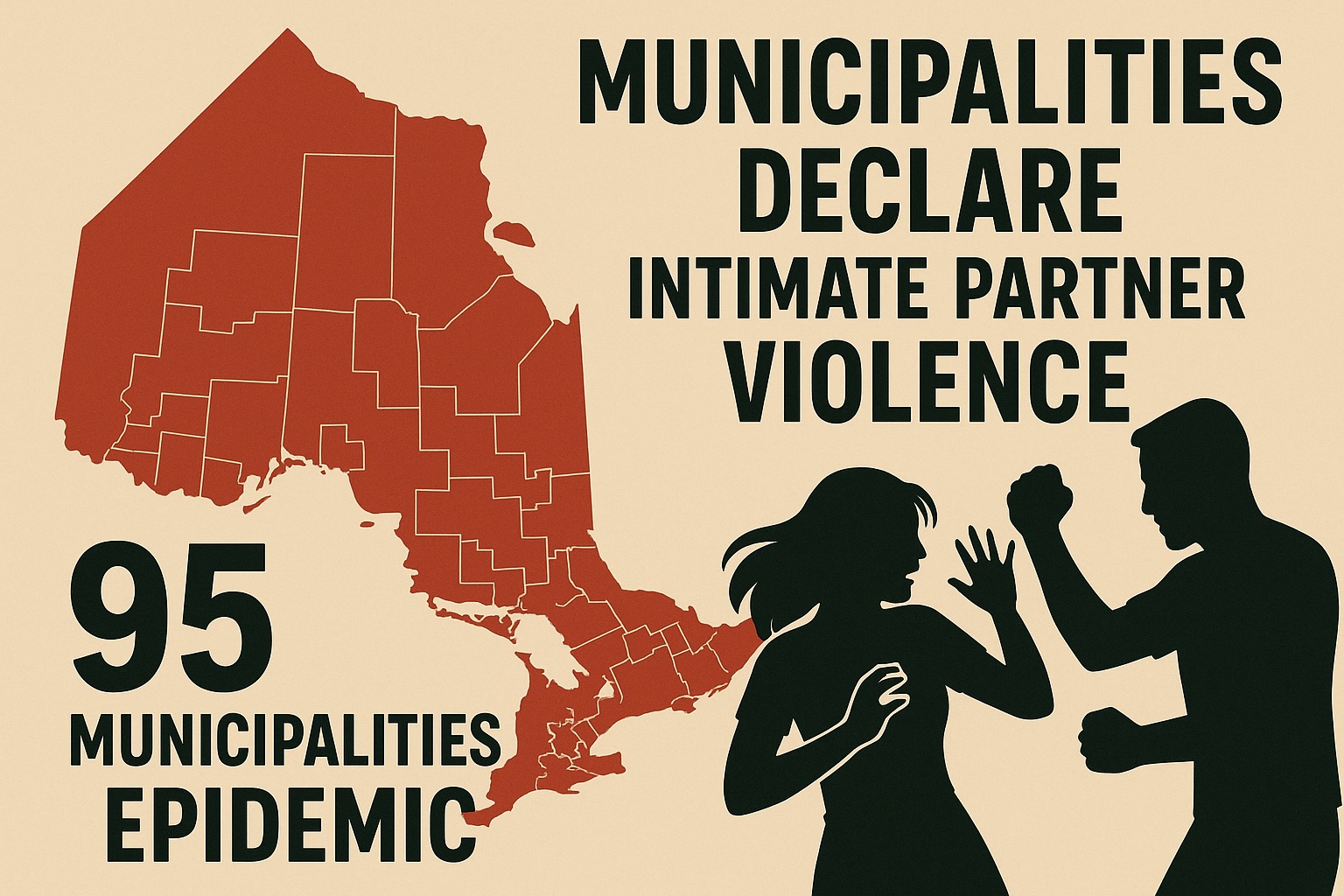📰 Over 100 Advocacy Groups Urge Ontario to Declare Intimate Partner Violence an Epidemic
More than 100 advocacy groups signed an open letter in December 2024 urging Ontario to declare intimate partner violence (IPV) an epidemic, citing 62 femicides in one year.

On December 6, 2024, the National Day of Remembrance and Action on Violence Against Women, a powerful open letter was delivered to Ontario Premier Doug Ford. Signed by more than 100 advocacy organizations, the letter demanded that Ontario finally recognize intimate partner violence (IPV) as an epidemic.
The timing was no coincidence. December 6 marks the anniversary of the École Polytechnique massacre in Montreal (1989), when 14 women were murdered in an act of gender-based violence. The date has since become a symbol of Canada’s ongoing fight against femicide and domestic violence.
With 62 femicides recorded in Ontario in 2024 alone, the open letter was both a remembrance and a call to action — urging the province to confront IPV as the public health crisis it truly is.
Key Demands in the Open Letter
The coalition outlined several urgent priorities:
Immediate Recognition of IPV as an Epidemic
Symbolic recognition is a first step toward systemic change, ensuring IPV is treated with the same urgency as other public health crises.
Full Implementation of the Renfrew County Inquest Recommendations
Following the 2015 triple femicide in Renfrew County, a 2022 coroner’s inquest made 86 recommendations to improve Ontario’s IPV response. Many remain unfulfilled.
Sustainable Funding for Survivor Services
The letter called for long-term investments in shelters, crisis lines, counseling programs, and transitional housing, rather than one-time emergency boosts.
Greater Accountability for Repeat Offenders
Advocates urged stricter bail conditions, probation monitoring, and firearm surrender enforcement for abusers with histories of violence.
Why This Letter Matters
Amplifying Survivor Voices
By uniting more than 100 organizations across legal, healthcare, social work, and community advocacy, the letter represented thousands of survivor stories that often go unheard.
Making Headlines
The open letter forced IPV into mainstream headlines, reminding Ontarians that femicide is not an isolated tragedy but a systemic epidemic.
Symbolic Timing
Released on December 6, the letter linked Ontario’s present-day IPV crisis to Canada’s history of gender-based violence, adding weight and urgency.
Cross-Sector Unity
The letter brought together a broad coalition: women’s shelters, Indigenous advocacy groups, immigrant support services, healthcare providers, lawyers, and social workers. Such unity is rare and demonstrates widespread consensus on the need for change.
Government Response and Criticism
Ontario’s government acknowledged the letter but did not shift its position. Officials pointed to existing funding commitments for gender-based violence services.
However, critics argue:
Current funding does not meet the scale of need, especially in rural and northern communities where survivors are turned away nightly.
Without declaring IPV an epidemic, the province fails to signal the crisis-level urgency the situation demands.
Survivors see this resistance as a dismissal of their lived realities, deepening mistrust in government systems.
The Symbolism of 62 Femicides in One Year
Statistics tell part of the story:
62 women and girls were killed in Ontario in 2024 due to intimate partner or family violence.
Many of these cases involved repeat offenders with known histories of abuse.
Several victims had previously sought help from police or courts but fell through systemic cracks.
The number underscores that IPV is not an isolated problem — it is widespread, deadly, and preventable with the right interventions.
The Path Forward: What Advocates Want
Formal Epidemic Declaration
A symbolic but powerful first step that would align Ontario with municipalities and advocacy groups already recognizing the crisis.Full Renfrew Recommendations
Implementation of all 86 coroner’s inquest recommendations, from improved survivor services to stronger offender accountability.Sustained, Predictable Funding
Shelters and crisis lines need multi-year funding commitments to expand capacity and plan services, not piecemeal grants.Judicial and Police Reform
Training and accountability mechanisms to ensure survivors are believed, protected, and prioritized.Community Awareness Campaigns
Provincial investment in education to break stigma and encourage survivors to seek help early.
Conclusion
The open letter of December 6, 2024, was more than a petition — it was a province-wide call to action. By uniting over 100 organizations and invoking the symbolism of the National Day of Remembrance, advocates made it clear: Ontario cannot continue to downplay intimate partner violence.
Until the province formally declares IPV an epidemic and invests in systemic reform, survivors and communities will continue to pay the price. The letter’s message is unambiguous: survivors will not remain silent, and advocates will not stop pressing for change.
FAQs
1. When was the open letter to Ontario released?
On December 6, 2024, the National Day of Remembrance and Action on Violence Against Women.
2. How many organizations signed the letter?
Over 100 organizations across Ontario, including shelters, legal clinics, healthcare providers, and advocacy groups.
3. What was the main demand?
That Ontario declare intimate partner violence an epidemic.
4. How many femicides occurred in Ontario in 2024?
62 femicides, many linked to intimate partner violence.
5. What recommendations are being referenced?
The Renfrew County Inquest recommendations (2022), which outlined 86 systemic reforms to prevent IPV-related deaths.
